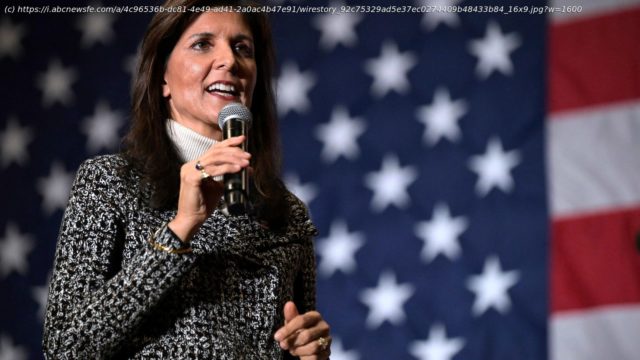Nikki Haley’s messages on race are sometimes contradictory
— Four years after South Carolina removed the Confederate battle flag from its Statehouse grounds, Nikki Haley offered two separate explanations of the flag’s meaning in less than a week.
Haley, the state’s governor when the flag was pulled in 2015 from its place of honor in Columbia, said in a 2019 interview with conservative radio host Glenn Beck that the man who shot and killed eight Black churchgoers in Charleston — murders that were the impetus for the flag’s lowering — had “hijacked” a symbol that many people took to stand for “service and sacrifice and heritage.” Two days later, she wrote in the , “Everyone knows the flag has always been a symbol of slavery, discrimination and hate for many people.”
The two messages capture Haley’s sometimes contradictory messages on race. Throughout her career, the South Carolina-born daughter of Indian immigrants has generally called out acts of individual prejudice and the people responsible. But Haley, now a Republican presidential candidate, has avoided denouncing society or groups of people as racist.
As the GOP primary race moves to South Carolina and its Feb. 24 contest, Haley is trying to cut into former President Donald Trump’s advantage. He has repeatedly attacked adversaries throughout his career with racist language, trying to appeal to as many voters as possible without alienating conservatives who reject the idea that systemic racism exists in the United States.
But Haley’s approach has drawn bipartisan criticism at times, particularly after a December town hall when Haley refused to say slavery had been a cause of the Civil War. She later walked back those remarks, saying that “of course the Civil War was about slavery.”
Haley was pushed for more answers on her feelings about race when she was interviewed Wednesday on “The Breakfast Club,” a nationally syndicated hip hop morning radio show on which presidential candidates and other politicians have discussed issues of race.
Asked about the 2015 shooting at Charleston’s Mother Emanuel African Methodist Episcopal Church, Haley told co-host Charlamagne tha God that the national media “came in and wanted to define” the event and “wanted to make it about racism.” Haley acknowledged, after being pressed, that the killings were “motivated” by racism. Dylann Roof, a white man, was convicted and sentenced to death.
The Haley campaign did not respond to a request for comment.
Haley and Trump are competing for votes both along South Carolina’s rapidly growing coast with its booming aerospace and defense industries and in the rural swaths of a state where the Civil War began more than 150 years ago. Some in South Carolina still venerate the Confederate cause and play down the fact that Southern political leaders wanted to secede to keep slavery intact, as well as the lasting legacy of official federal and state discrimination against Black people.
Start
United States
USA — mix Nikki Haley has called out prejudice but rejected systemic racism throughout her...






